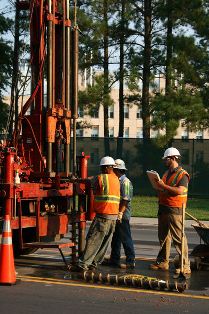 NEW YORK (CNNMoney) -- Despite a short reprieve during the recession, the number of jobs moving to the nation's suburbs grew over the last decade, potentially clogging roadways and reducing job access for the poor.
NEW YORK (CNNMoney) -- Despite a short reprieve during the recession, the number of jobs moving to the nation's suburbs grew over the last decade, potentially clogging roadways and reducing job access for the poor.
Jobs within 3 miles of a city center fell from 24.5% of overall positions in 2000 to 22.9% in 2010, according to a report released Thursday from the Brookings Institution. During the same time, jobs in the outer suburbs -- between 10 and 35 miles of a city's center -- grew from 40.9% in 2000 to 43.1% in 2010.
The recession halted the flight of jobs to the suburbs for a few years as industries like manufacturing, construction and retail -- businesses that thrive in a city's outer regions -- bore the largest brunt of layoffs. But by 2010, the suburbs accounted for nearly twice the share of jobs as city centers, continuing a trend that has been underway for decades.
"Where the jobs are matters to the overall development of a region," said Elizabeth Kneebone, a fellow at Brookings' Metropolitan Policy Program. "It can impact long-term productivity."
Low-density development away from city centers can be a drag on growth for several reasons, Kneebone said.
For poorer people without access to a car, it can make it harder to physically get to a job. For those with a car, it can lead to longer commute times and more money spent on gas.
It's also more expensive for taxpayers. Infrastructure costs can be 40% higher in low-density areas than higher ones, she said.
Innovation can also be crimped, as fewer people from similar industries get to interact with one another. Brookings pointed out in a separate report that patenting rates are higher in more densely populated locales.
Kneebone noted that not all suburban job growth is done poorly. Some metro regions, like San Francisco, have done a good job concentrating suburban job growth in specific areas, eliminating many of the potential negatives. Other regions are physically constrained from growing any more near their downtown, due to obstacles like mountains or water.
The metro regions with the highest rate of job density are San Jose, Calif.; Las Vegas; Virginia Beach; Salt Lake City and New York.
The regions with the most "job sprawl" are Detroit, Chicago, Atlanta, Philadelphia and St. Louis.
Despite the much-hyped revitalization taking place in many city centers across the country, Kneebone said the jobs are not necessarily following the shift of residents toward downtown districts. In many places, these new urban dwellers end up reverse commuting to the suburbs for work.
She thinks better planning and zoning laws are required to encourage denser development, and urged more cooperation at both the regional level and among government agencies, such as economic development and transportation departments.
The Brookings report looked at the nation's 100 largest metro areas, which account for about two-thirds of both the country's population and its jobs.
Portland and Seattle
Free Subscription to Breaking News
Free Subscription to Breaking News























































































































































































































































































































































